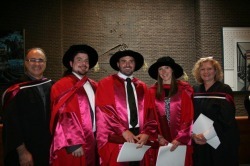PhD graduation celebration

Biochemistry professors Janet Brunton and Rob Bertolo had a lot to celebrate at Memorial University’s recent convocation.
Three of the students they co-supervised, Matthew Nosworthy, Laura McBreairty and Jason Robinson, all picked up their PhDs during the May 26th ceremony.
It’s an impressive accomplishment for a department that typically has less than 10 active PhD students at any one time, and particularly for a single research group within that department.
All three graduates have since moved on to the next phase of their professional careers. Dr. Nosworthy, Dr. McBreaity and Dr. Robinson have each found postdoctoral positions in Winnipeg, Saskatoon and Houston, Texas respectively.
The Brunton/Bertolo research group typically has eight graduate students, but over the summer months the group often doubles as they pick up a large number of undergraduate researchers.
“Our group got big fairly quickly because the kind of research projects we do are tremendously labour intensive, and the students that are responsible need a lot of hands to help them throughout the project,” said Dr. Brunton. “So they work in pairs and teams, and these three all became very familiar with each other’s work, because it’s reciprocal.”
However, Dr. Brunton says the team took a big hit this winter with what they hope was the temporary loss of Dr. Elaine Dodge. The long-time biochemistry employee was rushed to hospital in early 2015 with a bacterial infection that quickly made its way through her bloodstream causing multi-organ failure. She barely survived and one of the permanent effects of this infection has been amputation of almost all digits of her hands and feet.
“Elaine worked for many years managing our lab for us,” said Dr. Brunton. “We're missing her terribly for lots of reasons. But we’re hoping she can come back.”
“Elaine was the lynchpin of everything,” adds Dr. Bertolo. “We told our students, before you graduate, make sure you tell Elaine everything and give her all your data. She was our hard drive really. She knew all the techniques and would train the next group. But we lost three PhDs and Elaine all at once. It's a big gap.”
The team now begins the arduous task of re-building itself. They still have one more PhD student and a number of master’s students to help continue their work, but finding sources of funding to support the three-to-five year commitment of a new PhD student is never easy.
“If you want to develop anything new you need a PhD or post doc,” said Dr. Bertolo. “Master’s students usually take on defined projects that can be finished in two years and then they're out.
“But if I’m itching to do something new, a PhD student has three or four years to invest in it. You can also take risks with PhD students, and they enjoy the challenge.”
The pair agrees that PhD students can be among the most productive members of a research group.
“When you train a new student to work in a lab, they are only just getting going after a couple of years,” said Dr. Bertolo. “A master’s student would be finishing up then, but a PhD student can spend the next few years doing a lot of great, independent work for you, supervising students and leading projects.”
“The last couple of years are when they're really productive,” he added. “That's why you want to hang onto them as long as possible, but you can't. The good ones always have to go.”